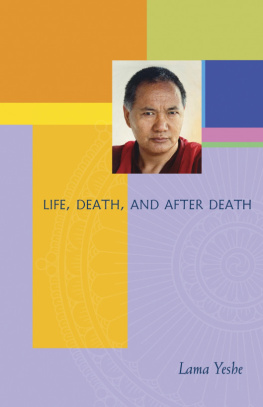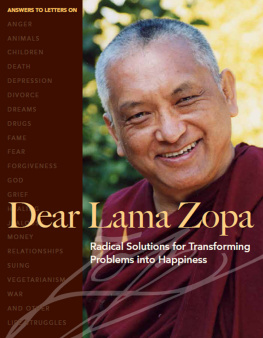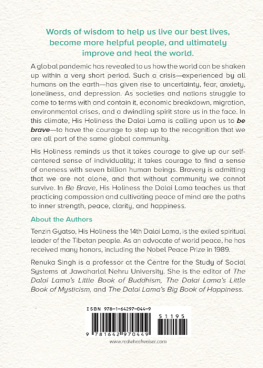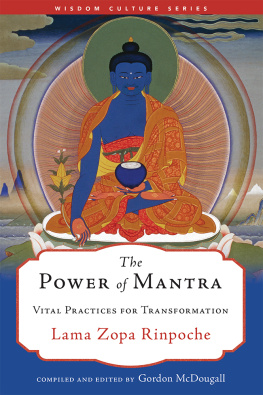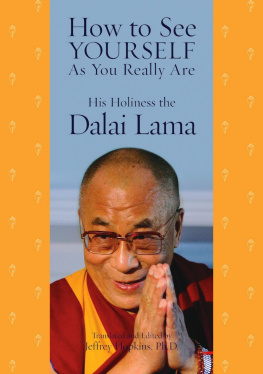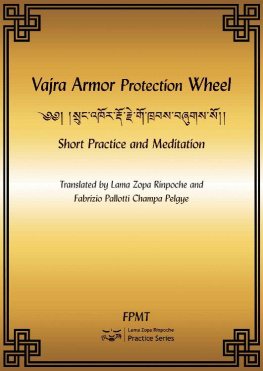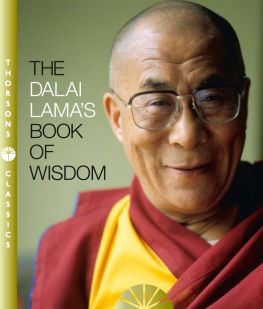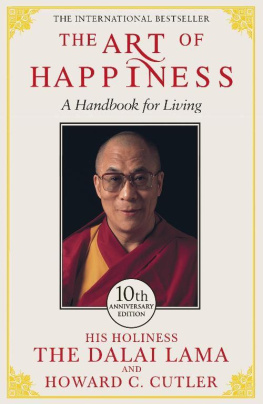Tenzin Gyatso - Happiness, Karma and Mind
Here you can read online Tenzin Gyatso - Happiness, Karma and Mind full text of the book (entire story) in english for free. Download pdf and epub, get meaning, cover and reviews about this ebook. genre: Religion. Description of the work, (preface) as well as reviews are available. Best literature library LitArk.com created for fans of good reading and offers a wide selection of genres:
Romance novel
Science fiction
Adventure
Detective
Science
History
Home and family
Prose
Art
Politics
Computer
Non-fiction
Religion
Business
Children
Humor
Choose a favorite category and find really read worthwhile books. Enjoy immersion in the world of imagination, feel the emotions of the characters or learn something new for yourself, make an fascinating discovery.

- Book:Happiness, Karma and Mind
- Author:
- Genre:
- Rating:4 / 5
- Favourites:Add to favourites
- Your mark:
- 80
- 1
- 2
- 3
- 4
- 5
Happiness, Karma and Mind: summary, description and annotation
We offer to read an annotation, description, summary or preface (depends on what the author of the book "Happiness, Karma and Mind" wrote himself). If you haven't found the necessary information about the book — write in the comments, we will try to find it.
Happiness, Karma and Mind — read online for free the complete book (whole text) full work
Below is the text of the book, divided by pages. System saving the place of the last page read, allows you to conveniently read the book "Happiness, Karma and Mind" online for free, without having to search again every time where you left off. Put a bookmark, and you can go to the page where you finished reading at any time.
Font size:
Interval:
Bookmark:
Happiness, Karma and Mind
His Holiness the Dalai Lama
With kind permission of His Holiness the Dalai Lama, Dharamsala.
From Second Dharma Celebration, November 5th-8th 1982, New Delhi, India.
Translated by Alex Berzin, clarified by Lama Zopa Rinpoche, edited by Nicholas Ribush.
First published by Tushita Mahayana Meditation Centre, New Delhi, 1982
Many billions of years elapsed between the origin of this world and the first appearance of living beings upon its surface. Thereafter it took an immense time for living creatures to become mature in thought-in the development and perfection of their intellectual faculties; and even from the time men attained maturity up to the present many thousands of years have passed. Through all these vast periods of time the world has undergone constant changes, for it is in a continual state of flux. Even now, many comparatively recent occurrences which appeared for a little while to remain static are seen to have been undergoing changes from moment to moment. One may wonder what it is that remains immutable when every sort of material and mental phenomenon seems to be invariably subject to the process of change, of mutability. All of them are forever arising, developing and passing away. In the vortex of all these changes it is Truth alone which remains constant and unalterable-in other words, the truth of righteousness (Dharma) and its accompanying beneficial results, and the truth of evil action and its accompanying harmful results. A good cause produces a good result, a bad cause a bad result. Good or bad, beneficial or harmful, every result necessarily has a cause. This principle alone is abiding, immutable and constant. It was so before man entered the world, in the early period of his existence, in the present age, and it will be so in all ages to come.
All of us desire happiness and the avoidance of suffering and of everything else that is unpleasant. Pleasure and pain arise from a cause, as we all know. Whether certain consequences are due to a single cause or to a group of causes is determined by the nature of those consequences. In some cases, even if the cause factors are neither powerful nor numerous, it is still possible for the effect factors to occur. Whatever the quality of the result factors, whether they are good or bad, their magnitude and intensity directly correspond to the quantity and strength of the cause factors. Therefore, for success in avoiding unwished for pains and in acquiring desired pleasures, which is in itself no small matter, the relinquishment of a great number of collective cause factors is required.
In analyzing the nature and state of happiness, it will he apparent that it has two aspects. One is immediate joy (temporary); the other is future joy (ultimate). Temporary pleasures comprise the comforts and enjoyments which people crave, such as good dwellings, lovely furniture, delicious food, good company, pleasant conversation and so on. In other words, temporary pleasures are what man enjoys in this life. The question as to whether the enjoyment of these pleasures and satisfactions derives purely from external factors needs to be examined in the light of clear logic. If external factors were alone responsible for giving rise to such pleasures a person would be happy when these were present and, conversely, unhappy in their absence. However, this is not so. For, even in the absence of external conditions leading to pleasure, a man can still be happy and at peace. This demonstrates that external factors are not alone responsible for stimulating man's happiness. Were it true that external factors were solely responsible for, or that they wholly conditioned the arising of, pleasure and happiness, a person possessing an abundance of these factors would have illimitable joy, which is by no means always so. It is true that these external factors do make partial contribution to the creation of pleasure in a man's lifetime. However, to state that the external factors are all that is needed and therefore the exclusive cause of happiness in a man's span of life is an obtuse and illogical proposition. It is by no means sure that the presence of such external factors will beget joy. On the contrary, factual happenings such as the experiencing of inner beatitude and happiness despite the total absence of such pleasure-causing external factors, and the frequent absence of joy despite their presence, clearly show the cause of happiness to depend upon a different set of conditioning factors.
If one were to be misled by the argument that the above-mentioned conditioning factors constitute the sole cause of happiness to the preclusion of any other conditioning causes, that would imply that (resulting) happiness is inseparably bound to external causal factors, its presence or absence being exclusively determined by them. The fact that this is obviously not so is a sufficient proof that external causal factors are not necessarily or wholly responsible for the effect phenomena of happiness.
Now what is that other internal set of causes? How are they to be explained? As Buddhists, we all believe in the Law of Karma-the natural law of cause and effect. Whatever external causal conditions someone comes across in subsequent lives result from the accumulation of that individual's actions in previous lives. When the karmic force of past deeds reaches maturity a person experiences pleasurable and unpleasurable mental states. They are but a natural sequence of his own previous actions. The most important thing to understand is that, when suitable (karmic) conditions resulting from the totality of past actions are there, one's external factors are bound to be favourable. The coming into contact of conditions due to (karmic) action and external causal factors will produce a pleasurable mental state. If the requisite causal conditions for experiencing interior joy are lacking there will be no opportunity for the occurrence of suitable external conditioning factors or, even if these external conditioning factors are present, it will not be possible for the person to experience the joy that would otherwise be his. This shows that inner causal conditions are essential in that these are what principally determine the realization of happiness (and its opposite). Therefore, in order to achieve the desired results it is imperative for us to accumulate both the cause-creating external factors and the cause-creating internal (karmic) conditioning factors at the same time.
To state the matter in simple terms, for the accrual of good inner (karmic) conditioning factors, what are principally needed are such qualities as having few wants, contentment, humility, simplicity and other noble qualities. Practice of these inner causal conditions will even facilitate changes in the aforementioned external conditioning factors that will convert them into characteristics conducive to the arising of happiness. The absence of suitable inner causal conditions, such as having few wants contentment, patience, forgiveness and so on, will prevent one from enjoying pleasure even if all the right external conditioning factors are present. Besides this, one must have to one's credit the force of merits and virtues accumulated in past lives. Otherwise, the seeds of happiness will not bear fruit.
The matter can be put in another way. The pleasures and frustrations, the happiness and suffering experienced by each individual are the inevitable fruits of beneficial and evil actions he has perpetrated, thus adding to his store. If at a particular moment in this present life the fruits of a person's good actions ripen he will recognize, if he is a wise man, that they are the fruits of (past) meritorious deeds. This will gratify him and encourage him to achieve more merits. Similarly, when a person happens to experience pain and dissatisfaction, he will be able to bear them calmly if he maintains an unshakable conviction that, whether he wishes it or not, he must suffer and bear the consequences of his own (past) deeds, notwithstanding the fact that normally he will often find the intensity and extent of his frustration hard to bear. Besides, the realization that they are nothing but the fruits of unskilled action in the past will make him wise enough to desist from unskilled deeds henceforth. Likewise, the satisfying thought that, with the ripening of past (evil) karma, a certain part of the evil fruit accrued by former unskilled action has been worked off will be a source of immense relief to him.
Font size:
Interval:
Bookmark:
Similar books «Happiness, Karma and Mind»
Look at similar books to Happiness, Karma and Mind. We have selected literature similar in name and meaning in the hope of providing readers with more options to find new, interesting, not yet read works.
Discussion, reviews of the book Happiness, Karma and Mind and just readers' own opinions. Leave your comments, write what you think about the work, its meaning or the main characters. Specify what exactly you liked and what you didn't like, and why you think so.

